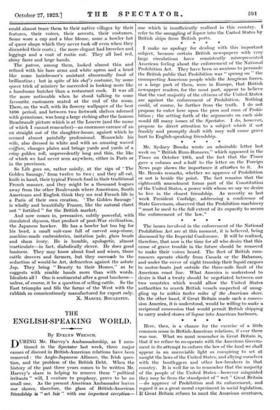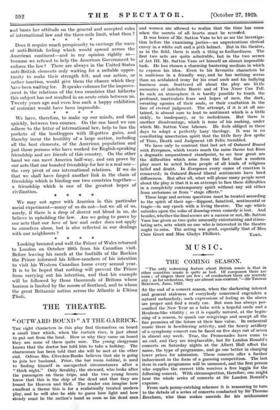THE
ENGLISH-SPEAKING WORLD.
By EVELYN WRENCH.
DURING Mr. Harvey's Ambassadorship, as I men- tioned in the Spectator last week, three major causes of discord in British-American relations have been removed ; the Anglo-Japanese Alliance, the Irish ques- tion, and the problem of the British Debt. When the history of the past three years comes to be written Mr. Harvey's share in helping to remove these " political irritants " will, I venture to prophesy, prove to be no small one. As the present American Ambassador leaves our shores, therefore, the glass of British-American friendship is " set fair '! with one important exception— one which is insufficiently realized in this country. I refer to the smuggling of liquor into the United States by British ships from British ports.
I make no apology for dealing with this important subject, because certain British newspapers with very large circulations have consistently misrepresented American feeling about the enforcement of the National Prohibition Act. They have been so anxious to persuade the British public that Prohibition was " sprung on " the unsuspecting American people while the Amarican forces, or a large part of them, were in Europe, that British newspaper readers, for the most part, appear to believe that the vast majority of the citizens of the United States are against the enforcement of Prohibition. Nothing could, of course, be further from the truth. I do not propose to enter here upon the pros and cons of Prohi- bition ; the setting forth of the arguments on each side would fill many issues of the Spectator. I do, however, propose to direct attention to a subject which if not frankly and promptly dealt with may well cause grave hurt to English-speaking friendship.
Mr. Sydney Brooks wrote an admirable letter last week on " British Rum-Runners," which appeared in the Times on October 19th, and the fact that the Times gave a column and a-half to the letter on the Foreign News page shows the importance it attaches to it. As Mr. Brooks remarks, whether we approve of Prohibition or not is beside the point. The fact remains that the eighteenth amendment forms part of the Constitution of the United States, a power with whom we say we desire to live in the closest friendship. As recently as last week President Coolidge, addressing a conference of State Governors, observed that the Prohibition machinery " must be used to the full extent of its capacity to secure the enforcement of the law."
* * * * The issues involved in the enforcement of the National Prohibition Act are at this moment, it is believed, being discussed by the Imperial Conference. It will be realized, therefore, that now is the time for all who desire that this cause of grave trouble in the future should be removed to make their voices heard. The fleet of British rum- runners operate chiefly from Canada or the Bahamas, and under the cover of night tranship their liquid cargoes to motor-boats just outside the three-mile limit of the American coast line. What America is understood to desire is that a treaty should be negotiated between our two countries which would allow the United States authorities to search British vessels suspected of smug- gling up to within twelve miles of the American shore. On the other hand, if Great Britain made such a conces- sion America, it• is understood, would be willing to make a reciprocal concession that would permit British shipping to carry sealed stores of liquor into American harbours.
Here, then, is a chance for the exercise of a little common sense in British-American relations, if ever there was one. What we must remember in Great Britain is, that if we refuse to co-operate with the American Govern- ment in its attempt to enforce the law of the land we shall appear in an unenviable light as conspiring to set at naught the laws of the United States, and allying ourselves with the bootleggers and other law-breakers in that country. It is well for us to remember that the majority of the people of the United States—however misguided they may be from the standpoint of " wet " Great Britain —do approve of Prohibition and its enforcement, and regard it as a great moral experiment in social legislation. If Great Britain refuses to meet the American overtures, and bases her attitude on the general and accepted rules of international law and the three-mile limit, what then ?
* * * * Does it require much perspicacity to envisage the wave of anti-British feeling which would spread across the American continent—and in my opinion rightly so— because we refused to help the American Government to enforce the law? There are always in the United States anti-British elements only -waiting for a suitable oppor- tunity to make their strength felt, and our action, or rather inaction, would give them the chance which they have been waiting for. It speaks volumes for the improve- ment in the relations of the two countries that hitherto this subject has not resulted in an acute crisis between us. Twenty years ago and even less such a happy exhibition of restraint would have been impossible.
* * * * We have, therefore, to make up our minds, and that quickly, between two courses. On the one hand we can adhere to the letter of international law, help to line the pockets of the bootleggers with ill-gotten gains, and thereby incur the hostility of a large section, including all the best elements, of the American population and just those persons who have worked for English-speaking friendship and are friends of this country. On the other hand we can meet America half-way, and can prove by our acts that our boasted friendship for her is a real one— the very pivot of our international relations. If we do that we shall have forged another link in the chain of friendship which is binding our two countries together— a friendship which is one of the greatest hopes of civilization. * * * * We may not agree with America in this particular social experiment—many of us do not—but we all of us, surely, if there is a drop of decent red blood in us, do believe in upholding the law. Are we going to prove by our acts that our love of law and order does not apply to ourselves alone, but is also reflected in our dealings with our neighbours ?
* * * * Looking bronzed and well the Prince of Wales returned to London on October 20th from his Canadian visit. Before leaving his ranch at the foothills of the Rockies the Prince informed his fellow-ranchers of his intention to visit his Western Canadian home every second year. It is to be hoped that nothing will prevent the Prince from carrying out his intention, and that his example will be followed by those thousands of Britons whose horizon is limited by the moors of Scotland, and to whom the great Britannic nation across the Atlantic is Ultima
Thule.















































 Previous page
Previous page